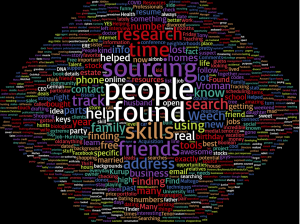If you’re curious how else you could help yourself or others with sourcing abilities outside of normal requisition- and pipelining-related work, your colleagues have recently provided ingenious inspiration. A SourceCon Facebook group post by Susanna Frazier, the three-time SourceCon Hackathon champion, has garnered an unusually broad range and large number of creative responses. These folks come from all walks of life, nationalities, and backgrounds. One thing that unites them all? They are all super-sleuths (read: snoops) and have back-up careers in front of them.
Randy Bailey provided additional detail to his story you’ll find in the Facebook thread: During the nadir after 2008’s US economic crash, the Massachusetts government was looking for “shovel ready” projects. “Community Boating had been lobbying the state for about 10 years that our dock situation had become dire. It was at least a decade past its useful life, being kept together with duct tape, bubble gum or whatever could keep it functional,” he said. “What finally made me get creative was a 30-foot section of dock that was no longer safe.”
I started poking around online and found a Yahoo message group talking about a “living room campaign stop” that the governor would attend. I wasn’t sure how to engage him but sourced the person who posted it and called her out of the blue. That call completely put her on edge, because who am I but some internet stranger? She lived in West Concord, where I was working at the time. I think she lived or worked in a building named after the landlord where our office was: a great guy, but I didn’t know how influential. Upon name-dropping him, it instantly cleared the “weirdness” factor and landed me an invitation to the event.
I was the third person who was able to ask him a question out of about 10 people. I said, “Hello, Governor, I’m Randy Bailey, a board member at Community Boating. I’m here because we have a problem…” He ended up finishing that sentence for me that we need a new dock. Up until this point, we had no idea if any of our grass-roots lobbyings had any impact, but clearly, it had! We had a good back and forth, and a month later, he was on the dock, pledging the money for the project.
The range of responses among the 145 post comments so far is fantastic. We’ve categorized most of them below to give you a better flavor for all the ways you and others can benefit from sourcing skills:
Crimes, Court Cases & Politics:
- We know a number of sourcers who have branched out to earn private investigator licenses (e.g., Gordon and Kim Lokenberg), but the post revealed that licensure isn’t required to be useful: some have helped track down debtors, thieves, people threatening violence and even fake online accounts to assist in divorce cases!
- Another did opposition political research to support a candidate, while several mentioned fact-checking to report disinformation.
Family & Reuniting:
- While investigating their own ancestry/genealogy, some have uncovered biological parents and relatives they didn’t know existed or long-lost ones.
- Some sourcers have helped other families do likewise, including tracking down a child that ran away from home.
- This tracking down also extends to former military combat colleagues, childhood friends, and classmates, enabling heartfelt reunions.
Financial & Product:
- Find tickets to sold-out concerts and learn about the reputations of businesses.
- Many people cited price comparisons and deal-hunting when shopping (including finding non-promoted discount codes), vacation and wedding planning, and home-hunting
- Find lost credit cards and wallets that contained minimal information and, after research, returned them to their rightful owners. For example, good samaritan Suvasanamayee Viswanatha used LinkedIn to return a driver’s license lost at a hospital: “One time I think someone was happy to open an inmail from a recruiter!”
- Stock market research to identify profitable opportunities. For Jenny Cones, her research has yielded a 205% gain on her portfolio! She believes stock picking is exciting and “an important muscle that needs to be built – especially for women.”
Hobbies:
- Creating challenges: You’re probably familiar with Jan Tegze‘s Sourcing Games and the various sleuthing challenges that sourcing experts create for hackathons, but this can extend to “armchair treasure hunts,” including virtual geocaching with riddles and ciphers (Jim Schnyder)
- Finding rare parts for cars or bicycles
- Gamers: Tony Stemen has aided “YouTubers for the past 10 years to help them contact the right people at gaming companies, so they can get free copies of games to review.”
Lovelife:
- Researching potential suitors for dating, particularly common before accepting a match on dating apps
- This kind of research has included verifying a divorce to ensure dating eligibility, revealing an affair in a married couple, among other examples.
- But it’s not always based on negative suspicion: Chris Murdock helped a friend track down his high school sweetheart. Both were divorced from others in the interim and today are married!
Other Applications Of Note:
- Conference speakers: verified their abilities via recorded YouTube presentations, obtained contact details, and nabbed some smart, dynamic presenters pro bono
- Conversations improve even for introverts when you utilize sourcer interview methods.
- COVID/medical contact tracing: Suzy Tonini got certified as a contact tracer a few months ago and was recently asked by the Washington State Health Department to assist. She also uncovered a group of fraudulent treasure hunters on a 1997 Yahoo Group chat, for which the investor was very grateful and flew her up to Detroit for an urgent meeting.
- Teach resume writing clients how to research and find jobs (Trish Wyderka et al.) or help a new digital forensics graduate to do advanced contact information searching using Maltego (Jim Schnyder)
- Schoolwork research: Craig Fisher showed his son how to find more obscure facts and resources.
- Some responses were just funny: one sourcer site: searches so often that he now capitalizes OR in all his typing!
- Lost keys – not what you’d think; it required phone skills (read Cory Clark‘s original comment)
What appears to be the most universal non-work use of sourcing? Checking out what your ex-significant others have been up to since! However, as Erin Mathew said in an earlier SourceCon post, there are many ways to use your sourcing superpowers for good, and you’d have to agree that most of the examples here support that. The above doesn’t include all the ways mentioned that sourcing skills had been used, so do check out the thread if you’re curious or want further details from those who posted.
Since most sourcers are good at pattern recognition, you might prefer this word cloud of relative popularity of terms across the responses:

Randy Bailey’s anecdote near the start of this article illustrates how you can leverage many sourcing techniques. “I use this story frequently in interviews, as a demonstration of my creativity,” he said. We hope this post has similarly inspired you to consider applying your growing skills in other creative and productive ways. It might also make you a better sourcer in your day job or, like Randy, provide interesting conversation fodder when interviewing for your next role!
